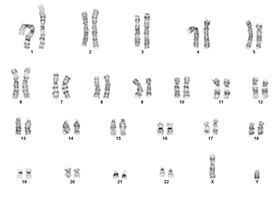 Cytogenetics is an exciting, dynamic field of study which analyzes the number and structure of human and animal chromosomes.
Cytogenetics is an exciting, dynamic field of study which analyzes the number and structure of human and animal chromosomes.
Changes that affect the number and/or structure of the chromosomes can cause problems with growth, development, and how the body functions. Chromosomal abnormalities can happen when egg and sperm cells are being made, during early fetal development, or after birth in any cell in the body. Changes to chromosome structure can disrupt genes, causing the proteins made from disrupted genes to be in overabundance, missing or faulty. Depending on size, location, and timing, structural changes in chromosomes can lead to birth defects, complex syndromes or even cancer. Alternatively, some chromosomal aberrations may have no effect on a person’s health.
Cytogenomic analyses are commonly performed during pregnancy to determine if a fetus is at risk for common syndromes caused by having extra (Down’s syndrome) or missing chromosomes (Turner’s syndrome), syndromes caused by structural abnormalities (like unbalanced translocations or inversions), or to determine if extra or missing genetic material is present through cytogenetic G-banding assays or through microarray-based SNP 6.0 testing.
The same cytogenetic analyses can be performed on a newborn or on a child with multiple anomalies or developmental delays to look for potential chromosomal abnormalities. With the information provided by cytogenomic analyses, more accurate diagnoses can be made, allowing for proper and timely treatment of the child. Information gained through cytogenomic testing is also valuable during reproductive discussions for couples planning to have children, where one or both parents may have rare diseases or higher risk of passing along a heritable disease.
Today, the diagnosis and treatment of several cancers including leukemia and lymphoma, as well as some solid tumors, depends heavily on cytogenomic analysis of specific chromosomal aberrations which are consistently observed in these particular cancers.
In genetic research, chromosome analysis of embryonic stem cells and induced pluripotent stem (iPS) cells is necessary to ensure the genetic integrity of these cell lines which show such promise in the treatment and development of cures for a multitude of complex human diseases.
The analysis of chromosomes in human development and disease is accomplished through classical cytogenetic procedures (such as G-banding) combined with advanced molecular techniques such as genomic microarray analysis.
The Coriell Institute Cytogenomics Laboratory provides not only detailed chromosomal analysis of all Coriell-banked human and animal cell lines available to worldwide genetic researchers, but also analyzes human and animal stem cell lines for academic research institutions and pharmaceutical clients engaged in cutting-edge stem cell research.